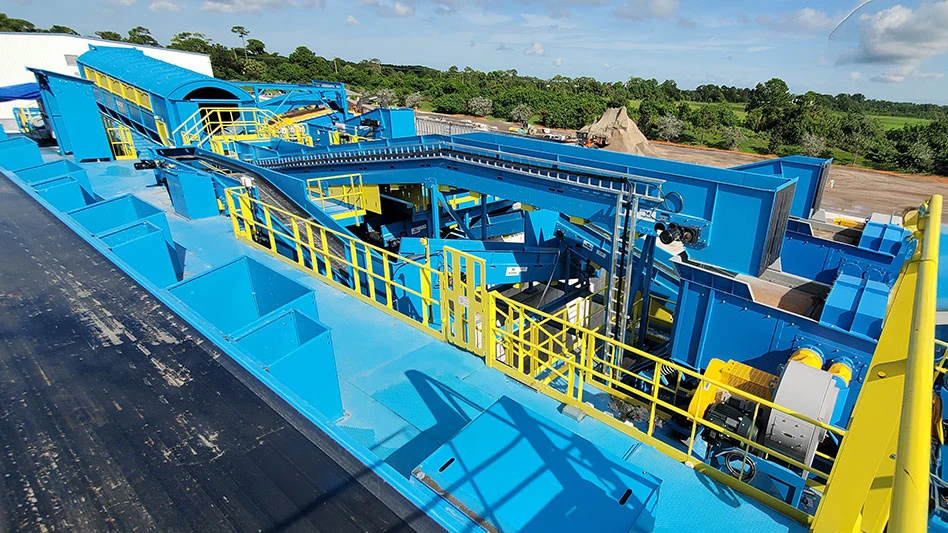R. Freedman & Sons Inc. strips apart derelict refrigerators, washing machines and stoves, cuts and pounds parts into fist-sized pieces of iron, and then sells scrap to mills where it is melted down and re-cast.
The company's offices are in part of an immense brick and olive-colored building that once served as an engine repair shop for the Delaware & Hudson Railway Co. The 12-acre site is covered with industrial haystacks of rusty springs and strips of metal.
Around 150 trucks and cars delivering scrap metal roll in and out of the site each day, said Tony Dawson, president of the company.
But since the beginning of November, trucks have been blocked from the company's main gate because the village outlawed truck traffic on a stretch of Tibbits Avenue.
In a motion filed in state Supreme Court in Albany County Oct. 30, Freedman asked the court to force the village of Green Island to remove barriers blocking the entrance.
"The new truck traffic plan is specifically targeted towards us," said Dawson, who bought into the 100-year-old company in 2000.
Formerly, trucks rumbled down Tibbits Avenue and turned into the company's front gate. But the village ordinance directs traffic to a newly constructed industrial access road that connects to the company's side gate.
The situation came to a head around 9:30 a.m. Nov. 1, when village workers used tractors and chains to put cement blocks, like the kind used to divide highways, in front of the company's chain-link gate.
"I looked out the window and shook my head in disgust," said Dawson.
R. Freedman has the only trucking entrance on the now-forbidden stretch of Tibbits Avenue. The new law increases shipping costs, causes logjams at the company's other gate on Cannon Street, and diverts deliveries of scrap metal right past a competitor. The law is part of a pattern targeting the company by Mayor John McNulty, Dawson said.
Though there are no other trucking entrances on the street, other companies frequently used the stretch of road in front R. Freedman for their trucks. The mayor has no vendetta against the company, said attorneys for the village.
"He wants Freedman to follow the laws and rules that other residents within Green Island follow, but nothing more than that," said Joshua Sabo, an attorney for the village.
The new truck route was established, in part, to try to encourage trucks to use the newly built industrial road, Veteran's Memorial Drive.
But the truck route was also a response to complaints from residential neighbors citing scrap metal in the streets and punctured tires, said Sabo.
Vendetta or not, the suit is the latest in a series of litigious disputes between the company and the village.
Founded over 100 years ago by immigrant Morris Freedman—who sold rags, bones and bottles throughout South Troy from a horse and wagon—R. Freedman has grown into an operation with 45 full-time employees. This year, the company's revenue will be between $8 million and $10 million, Dawson said.
But the company's recent history with both neighbors and the village has been contentious.
R. Freedman filed a suit in the spring of 2002 that alleges the village over-charged the company for water. The village counter-sued the company over unpaid water bills and sewer issues. In a decision dated Oct. 21, Albany County Supreme Court Justice Bernard Malone dismissed R. Freedman's request that the court keep the village from collecting on water payments. The village's counter motion for damages also was denied.
In December 2000, the company was sued by both the village of Green Island and Honeywell, a brake-pad manufacturer that owns the site adjacent to R. Freedman's property.
Honeywell and the village said explosions, caused by propane tanks mistakenly thrown in R. Freedman's metal shredder, were dangerous. They sought to stop R. Freedman from using the machine unless it could meet certain safety criteria. That case is being heard in state Supreme Court in Albany County.
In 1998, R. Freedman sued the city over a noise ordinance that limited the used of the company's metal shredder to daytime hours. R. Freedman's complaint was dismissed in a decision in the U.S. District Court, Northern District of New York in April 2001.
And then there is the current suit over access to the Tibbits Avenue gate. It has not yet been assigned to a judge.
As it stands, R. Freedman is conducting business through the side gate on Cannon Street. That puts the company in a difficult position: The street is not owned by the village. The Canadian Pacific Railroad controls the road and the tracks that run next to it.
R. Freedman pays Canadian Pacific $2,400 a year for the use of gate. If for any reason Canadian Pacific chose not to give the company access, R. Freedman would be stuck, Dawson said.
"We would have absolutely no access besides getting things air-lifted in and out," Dawson said. The Business Review (Albany, NY)
Latest from Recycling Today
- Greenwave raises revenue but loses money in Q2 2025
- Recycled steel prices hold steady
- EY says India’s need for scrap imports will continue
- Coming full circle
- Amcor, DCM introduce fertilizer packaging with 35 percent recycled content
- Comstock Metals gets closer to commissioning commercial-scale solar panel recycling facility
- Washington selects Circular Action Alliance as PRO
- Smurfit Westrock expands in Latin America





